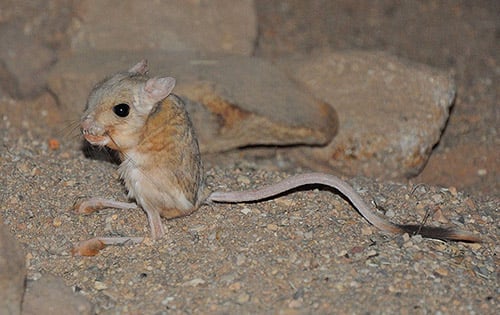



From fancy felines to bizarre scorpions and toads, Israel is home to a wide array of wildlife. While most of us couldn’t get out and visit them this summer, the cute, unusual and above all outdoorsy wild animals of Israel can be visited through our computer screens and through the pages of newspapers! Here are just a few examples.
Is it a kangaroo? Is it a gerbil? No, it’s a Jaculus, or a lesser Egyptian jerboa – a small, hopping rodent found in the deserts of the Middle East and Africa, Israel included.
The tiny rodent is a nocturnal, solitary animal that has incredible senses of smell, sight and hearing, making it super-aware of everything in its environment. It also has long kangaroo-like feet that enable it to leap almost 10 feet at a time and cover vast distances in its search of food.
In Israel, lesser Egyptian jerboas are dwindling because construction is minimizing their natural habitat and because cats living on the edges of town and cities are out hunting them, making them a protected species.
What looks like a fluffy kitten is in fact a completely wild animal most at home in sandy dunes and stony deserts across Africa and Asia.
Much smaller than domesticated cats, sand cats are solitary, nocturnal animals that spend their days hiding and going out at night to hunt their prey, which includes rodents, insects and lizards. Their pale, sandy coat helps them blend in with their surroundings, and fur on their feet helps protect them against the hot terrain.
No sand cats have been spotted in recent years in Israel, perhaps indicating that they have become extinct in the area, with the possible explanation that they were pushed out of their environment by larger canines such as large numbers of foxes. Let’s hope not.
The Near Eastern fire salamander can be found in Israel, Syria, Lebanon, Iran and Iraq. In Israel, it lives up north in the Carmel and Galilee regions, and is considered an endangered, protected species.
Fire salamanders are black with a pattern of yellow or orange spots on their back that is unique to each individual animal. Two venom glands on the back of their necks emit poison.
In the past, they were believed to be born in fires and to carry bad omens, but in fact they require a wet and moist environment to grow and prosper. They don’t bring any ill luck to anyone at all, save the small insects that they devour.
Not to be confused with a skunk (although they too emit a strong smell when threatened), marbled polecats are little hunters with poor eyesight and a good sense of smell.
They can be found from southeast Europe all the way to China, and in Israel they were first spotted in the early 20th century in the Jerusalem and Dead Sea areas. They have since made their way farther south into the desert, probably following the spread of agriculture to those once-arid areas.
The number of marbled polecats in Israel is unknown, and they are difficult to trap or observe in their natural habitat. They are mostly active in the mornings and evenings and don’t sleep in the same place twice, instead each night seeking a new place to lay their heads.
By Naama Barak/Israel21c(excerpted)
�










